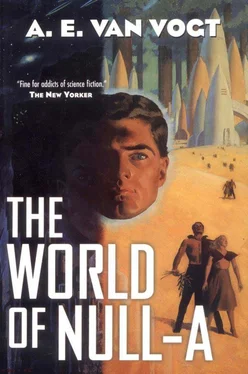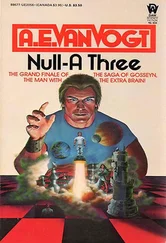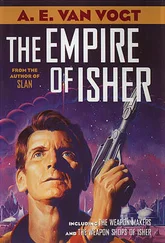“None.”
Gosseyn waited till she was out of sight down a stairway that led to the second basement. Then he followed. He caught a glimpse of her as he reached the bottom of the steps. She was pushing toward an exit at the end of a far corridor. He was halfway along the corridor when she ran up a staircase that led outside. By the time Gosseyn shoved his way up the stairs, she was nowhere to be seen. He turned back thoughtfully. The possibility that she would not risk the tests had made him follow her, but it was disturbing to have his suspicions proved. The problem of Teresa Clark was becoming more complex.
More upset than he had expected, Gosseyn entered a vacant examination booth in the G section. The door had barely clicked shut behind him when a voice from a speaker said matter of factly, “Your name?”
Gosseyn forgot Teresa Clark. Here was the crisis.
The booth contained a comfortable swivel chair, a desk with drawers, and a transparent paneling above the desk, behind which electron tubes gleamed in a variety of cherry-red and flame-yellow patterns. In the center of the panels, also made of transparent plastic, was an ordinary streamlined speaker. It was from this that the voice of the Machine had come. It repeated now, “Your name? And please grasp the nodes.”
“Gilbert Gosseyn,” said Gosseyn quietly.
There was silence. Some of the cherry-red tubes flickered unsteadily. Then: “For the time being,” said the Machine in a casual tone, “I'll accept that name.”
Gosseyn sank back deeper into the chair. His skin warmed with excitement. He felt himself on the verge of discovery. He said, “You know my true name?”
There was another pause. Gosseyn had time to think of a machine that was at this very moment conducting tens of thousands of easygoing conversations with the individuals in every cubbyhole in its base. Then: “No record in your mind of another name,” said the Machine. “But let's leave that for now. Ready for your test?”
“B-but–”
“No further questions at this moment,” said the Machine more formally. Its tone was comfortable when it spoke again. “You'll find writing materials in one of the drawers. The questions are printed on each sheet. Take your time. You've got thirty minutes, and you won't be able to leave the room till they're up. Good luck.”
The questions were as Gosseyn had expected: “What is non-Aristotelianism? What is non-Newtonianism? What is non-Euclidianism?”
The questions were not really easy. The best method was not to attempt a detailed reply but to show consciousness of the multi-ordinal meaning of words, and of the fact that every answer could be only an abstraction. Gosseyn began by putting down the recognized abbreviation for each term-null-A, null-N, and null-E.
He finished in about twenty minutes, then sat back tingling with anticipation. The Machine had said, “No further questions at this moment.” That seemed to imply that it would talk to him again. At the end of twenty-five minutes its voice came once more.
“Please don't be surprised at the simplicity of today's test. Remember, the purpose of the games is not to beguile the great majority of the contestants into losing. The purpose is to educate every individual of the race to make the best possible use of the complex nervous system which he or she has inherited. That can only be realized when everybody survives the full thirty days of the games. And now, those who failed today's test have already been informed. They will not be accepted as contestants during the rest of this season's games. To the rest-more than ninety-nine per cent, I am happy to say-good luck for tomorrow.”
It was fast work. He had simply put his paper into the slot provided. A television tube had scanned it, compared it to the correct answers in highly flexible fashion, and recorded a pass. The answers of the twenty-five thousand other contestants had been similarly judged. In a few minutes another group of contestants would repeat the experience.
“You wish to ask more questions, Gilbert Gosseyn?” asked the Machine.
Gosseyn tensed. “Yes. I have had some false ideas planted in my mind. Were they put there with a purpose?”
“They were.”
“Who put them there?”
“No records of that exists in your brain.”
“Then how do you know they were put there?”
“Logical reasoning,” said the Machine, “on the basis of information. The fact that your illusion was related to Patricia Hardie is very suggestive to me.”
Gosseyn hesitated, then spoke the thought that had been in his mind. “Many psychoneurotics have equally strong beliefs. Such people usually claim identification with the great: 'I am Napoleon'; 'I am Hitler'; 'I am Tharg'; 'I am married to Patricia Hardie.' Was my false belief in that category?”
“Definitely no. Very strong convictions can be induced by hypnotic means. Yours comes under that heading. That is why you were able to throw off the emotion of grief when you first learned that she was not dead. Your recovery is not yet completed, however.”
There was a pause. Then the Machine spoke again and there was a curious sadness in its words. “I am only an immobile brain, but dimly aware of what is transpiring in remote parts of Earth. What plans are brewing I can only guess. You will be surprised and disappointed to learn that I can tell you nothing more about that.”
“What can you tell me?” asked Gosseyn.
“That you are very deeply involved, but that I cannot solve your problem. I want you to go to a psychiatrist and have a photograph taken of your cortex. I have an impression of something in your brain, but I cannot define it. And now that is all I will say to you. Good-by until tomorrow.”
There was a click from the door as it unlocked automatically. Gosseyn went out into the corridor, hesitated for a moment, and then worked his way northward through the hurrying crowds.
He found himself on a paved boulevard. To the northwest, starting at about a quarter of a mile from the Machine, other buildings began. They were geometrically arranged in clusters around the boulevard, at the far end of which, amid embanked flowers and trees, stood the palace of the Machine.
The palace was not tall; its stately contours nestled among the vivid green and brilliance of its verdant environment. But that wasn't what held Gosseyn. His mind was reaching, visualizing, comprehending. President Hardie and his daughter Patricia lived there. If he was deeply involved, then so must they be. What had made them plant in his mind the conviction that he was married to a dead Patricia? It seemed futile. Any hotel-group lie detector would have found him out even if Nordegg hadn't been around to accuse him.
Gosseyn turned and strode around the base of the Machine back toward the city proper. He ate lunch in a small restaurant near the river, then began to thumb through the yellow pages of a telephone directory. He knew the name he was looking for, and he found it almost right away:
ENRIGHT, DAVID LESTER, psychologist
709 Medical Arts Building
Enright had written several books which were prescribed reading for anyone who hoped to get beyond the tenth day in the games. It was a pleasure to remember the crystal-like clarity of the man's writing, the careful semantic consideration given to every multi-ordinal word used, the breadth of intellect and understanding of the human body-and-mind-as-a-whole.
Gosseyn closed the directory and went out into the street. He felt at ease; his nerves were calm. Hope was surging in him. The very fact that he remembered Enright and his books in such detail showed how lightly the intruding amnesia rested on his memory. It shouldn't take long once the famous man began to work on him. The reception clerk in the doctor's office said, “Dr. Enright can be seen by appointment only. I can give you an hour three days from now; that is, Thursday at two P.M. You must, however, make a twenty-five-dollar deposit.”
Читать дальше










